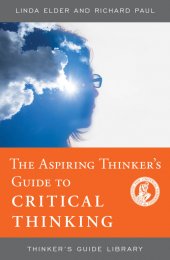The Aspiring Thinker's Guide to Critical Thinking
Linda Elder and Richard Paul
Contact Info for Rowman & Littlefield:
- Toll free: (800) 462-6420 ext. 3024
- Fax: (800) 338-4550
- Orders to orders@rowman.com
- Queries to customercare@rowman.com
This critical thinking guide introduces concepts and strategies for developing essential reasoning skills and intellectual character. As students advance in their academic studies and encounter new situations in their lives, they must learn to differentiate fact from fiction and make decisions based in good reasoning. They must learn to be clear, accurate, relevant, logical, and fair when expressing ideas. The Aspiring Thinker’s Guide to Critical Thinking lays out a clear framework for guiding this development and encouraging lifelong intellectual curiosity.
As part of the Thinker’s Guide Library, this book advances the mission of the Foundation for Critical Thinking to promote fairminded critical societies through cultivating essential intellectual abilities and virtues across every field of study across world.
Rowman & Littlefield Publishers / The Foundation for Critical Thinking
Pages: 48 • Trim: 5 3/4 x 8
978-0-944583-41-8 • Paperback • January 2009
978-1-5381-3376-7 • eBook • June 2019
Series:
Thinker's Guide Library
$28.00
Additional Information About:
The Aspiring Thinker's Guide to Critical Thinking
Humans live in a world of thoughts. We accept some thoughts as true. We reject others as false. But the thoughts we perceive as true are sometimes false, unsound, or misleading. And the thoughts we perceive as false and trivial are sometimes true and significant. The mind doesn’t naturally grasp the truth. We don’t naturally see things as they are. We don’t automatically sense what is reasonable and what unreasonable. Our thought is often biased by our agendas, interests, and values. We typically see things as we want to. We twist reality to fit our preconceived ideas. Distorting reality is common in human life. It is a phenomenon to which we all, at times, unfortunately fall prey.
We need a systematic way to further sound thinking and limit unsound thinking. We need to take command of our minds in order to determine in a reasonable way what thinking to accept and what to reject. Critical thinking is that process, that orientation, and in the finest cases, that way of living.
This guide focuses on the essence of critical thinking concepts. For teachers it provides a shared concept of critical thinking. For students it introduces critical thinking and provides strategies for developing one’s own critical thinking. Teachers can use it to design instruction, assignments, and tests in any subject. Students can use it to improve their learning in any content area.
The skills implicit in this guide apply to all subjects. For example, critical thinkers are clear as to the purpose at hand and the question at issue. They question information, conclusions, and points of view. They strive to be clear, accurate, precise, and relevant. They seek to think beneath the surface, to be logical, and fair. They apply these skills to their reading and writing as well as to their speaking and listening. They apply them in all subjects and throughout life.
